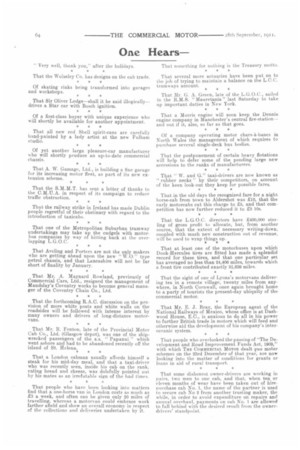One Hears " Very well, thank you," after the holidays.
Page 2

If you've noticed an error in this article please click here to report it so we can fix it.
That the Wolseley Co. has designs on the cab trade.
Of skating rinks being transformed into garages and workshops.
That Sir Oliver Lodge—shall it be said illogically— drives a Star car with Bosch ignition.
Of a first-class buyer with unique experience who will shortly be available for another appointment.
That all new red Shell spirit-cans are carefully hand-painted by a lady artist at the new Fulham studio.
Of yet another large pleasure-car manufacturer who will shortly produce an up-to-date commercial chassis.
That A. W. Gamage, Ltd., is building a fine garage for its increasing motor fleet, as part of its new extension scheme.
That the S.M.M.T. has sent a letter of thanks to the C.M.U.A. in respect of its campaign to reduce traffic obstruction.
That the railway strike in Ireland has made Dublin people regretful of their obstinacy with regard to the introduction of taxicabs.
That one of the Metropolitan Suburban tramway undertakings may take up the cudgels with motor bus companies by way of hitting back at the overlapping L. G. O. C.
That Aveling and Porters are not the only makers who are getting ahead upon the new " W.0." type petrol chassis, and that Lancashire will not be far short of finality by January.
That Mr. A. Maynard Rowland, previously of Commercial Cars, Ltd., resigned the management of Mandslay's Coventry works to become general manager of the Coventry Chain Co., Ltd.
That the forthcoming R.A.C. discussion on the provision of more white posts and white walls on the roadsides will be followed with intense interest by many owners and drivers of long-distance motorvans.
That Mr. R. Fenton, late of the Provincial Motor Cab Co. Ltd. (Glasgow depot), was one of the shipwrecked' passengers of the as. " Papanui " which went ashore and had to be abandoned recently off the island of St. Helena.
That a London cabman usually affords himself a steak for his mid-day meal, and that a taxi-driver who was recently seen, inside his cab on the rank, eating bread and cheese, was dolefully pointed out. by his mates as an irrefutable sign of the bad times.
That people who have been looking into matters find that a one-horse van in London costs as much as £3 a week, and often can be given only 20 miles of travelling, whereas a motorvan could embrace work farther afield and show an overall economy in respect of the collections and deliveries undertaken by it. That something for nothing is the Treasury motto.
That several more actuaries have been put on to the job of trying to maintain a balance on the L.C.C. tramways account.
That Mr, G. A. Green, late of the L.G.O.C., sailed in the 11,111.S. "Mauretania" last Saturday to take up important duties in New York.
That a Morris engine will soon keep the Dennis engine company in Manchester's central fire-stationand out if it, also, so far as that goes.
Of a company operating motor chars-a-bancs in North Wales the management of which requires to purchase several single-deck bus bodies.
That the postponement of certain heavy flotations will help to defer some of the pending large new accessions to the ranks of manufacturers.
That " W. and G." taxi-drivers are now known as "rubber necks' by their competitors, on account of the keen look-out they keep for possible fares.
That in the old days the recognized fare for a night horse-cab from town to Aldershot was 210, that the early motorcabs cut this charge to £6, and that competition has now further reduced it to 23 10s.
That the L.G.O.C. directors have £400,000 sterling of gross profit to allocate, but, from another source, that the extent of necessary writing-down, coupled with much new construction out of revenue, will be used to wrap things up.
That at least one of the motorbuses upon which Dock-Hercules tires are fitted has made a splendid record for these tires, and that one particular set has averaged no less than 24,406 miles, towards which A front tire contributed exactly 31,639 miles.
That the sight of one of Lyons's motorvans delivering tea in a remote village, twenty miles from anywhere, in North Cornwall, once again broufght home to a party of tourists the present-day ubiquity of the commercial motor.
That Mr. E. J. Bray, the European agent of the National Railways of Mexico, whose office is at Dashwood House, E.C., is anxious to do all in his power to further British trade in motors which will feed and otherwise aid the development of his company's interoceanic system.
That people who overlooked the passing of "The Development and Road Improvement Funds Act, 1909," with which THE COMMERCIAL MOTOR dealt qua motor schemes on the 23rd December of that year, are now looking into the matter of conditions for grants or loans in aid of rural transport.
That some dishonest owner-drivers are working in pairs, two men to one cab, and that, when ten or eleven months of wear have been taken out of hirepurchase cab No. 1, the name of the partner is used to secure cab No 2 from another trusting maker, the while, in order to avoid expenditure on repairs and annual overhaul, payments on cab No. 'I are allowed to fall behind with the desired result from the ownerdrivers' standpoint.






















